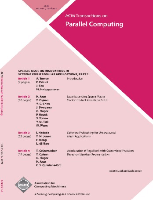
ACM Transactions on Parallel Computing
Scope & Guideline
Advancing the Frontiers of Parallel Computing
Introduction
Aims and Scopes
- Parallel Algorithms and Architectures:
The journal emphasizes the development and analysis of parallel algorithms, exploring various architectures including multi-core systems, GPUs, and distributed computing environments. - Performance Optimization Techniques:
Research on performance tuning, optimization strategies, and benchmarking for parallel computing applications is a core area of focus, aiming to enhance efficiency and execution speed. - Graph and Data Analysis:
A significant portion of the journal's content is dedicated to algorithms and methodologies for large-scale graph processing and data analytics, reflecting the growing importance of these fields. - Fault Tolerance and Reliability in Parallel Systems:
The journal addresses issues related to fault tolerance, resilience, and reliability in high-performance computing systems, ensuring that parallel applications can recover from failures. - Energy Efficiency and Sustainability:
Research on energy-efficient computing practices and sustainable approaches in parallel computing is increasingly prominent, highlighting the need to reduce energy consumption in computational processes.
Trending and Emerging
- Machine Learning and AI in Parallel Computing:
There is a growing emphasis on the application of machine learning techniques to optimize parallel computation tasks, as evidenced by recent papers focusing on kernel selection and graph neural networks. - Decentralized and Cloud-Based Computing Solutions:
The trend towards decentralized computing and cloud-based data processing is on the rise, with research exploring adaptive scheduling and task management in cloud environments. - Advanced Graph Algorithms and Their Applications:
The proliferation of advanced algorithms for graph analytics and their applications in various domains is a prominent theme, reflecting the increasing complexity and importance of graph-based data. - Energy-Efficient Parallel Computing:
Research focusing on energy-efficient methodologies, particularly for multi-GPU systems and heterogeneous computing environments, is gaining traction, highlighting the importance of sustainability. - Fault Tolerance Mechanisms in High-Performance Systems:
Emerging strategies for ensuring fault tolerance in parallel computing systems are being prioritized, indicating a proactive approach to enhancing system reliability.
Declining or Waning
- Traditional High-Performance Computing Techniques:
There has been a noticeable decline in papers focusing solely on traditional HPC methods without integration of modern parallel frameworks or architectures, indicating a shift towards more contemporary approaches. - Basic Parallel Programming Models:
Research centered around foundational parallel programming models, such as basic MPI or OpenMP implementations, is less prominent, as newer models and paradigms gain traction. - Static Scheduling Approaches:
Static scheduling methods for parallel task management are becoming less common, as more dynamic and adaptive scheduling strategies are favored in recent research.
Similar Journals
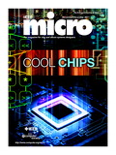
IEEE MICRO
Exploring the Frontiers of Electrical EngineeringIEEE MICRO is a prestigious journal published by the IEEE Computer Society, focusing on the latest advancements in the fields of electrical and electronic engineering, hardware, and software architecture. With a remarkable track record since its inception in 1981, this influential journal holds a Q1 classification in its respective categories, underscoring its significant impact in research and practical applications. The journal enjoys an impressive ranking within the 80th percentile in Electrical and Electronic Engineering and the 78th percentile in Hardware and Architecture, further cementing its reputation among the academic and professional community. Though not an open access journal, IEEE MICRO provides vital insights and cutting-edge research findings that shape the future of technology, making it an essential resource for researchers, practitioners, and students eager to stay at the forefront of innovation.

Journal of Grid Computing
Connecting Research and Industry in Grid ComputingThe Journal of Grid Computing, published by Springer, stands as a pivotal resource in the dynamic field of computer science, particularly within the realms of Computer Networks and Communications, Hardware and Architecture, Information Systems, and Software. With an impressive Q1 ranking across these categories in 2023, the journal exemplifies excellence and rigor, catering to a diverse readership from researchers to industry professionals. Established in 2003, this esteemed journal is anchored in the Netherlands and releases cutting-edge research that reflects trends and advancements in grid computing technologies. Researchers can gain insights through its vast contributions, while institutions benefit from its prestigious standing within the SCOPUS framework, boasting high percentile ranks in multiple computer science categories. Though not open access, the journal provides unparalleled access options for institutional subscribers, solidifying its importance as a gateway to innovative discoveries in high-performance distributed computing.

Theoretical Computer Science
Innovating Knowledge in Mathematical LogicTheoretical Computer Science, published by Elsevier, serves as a pivotal platform in the field of computational theory, exploring the foundational aspects of computer science and mathematical logic since its inception in 1975. With both a print ISSN of 0304-3975 and an E-ISSN of 1879-2294, this journal is esteemed for its rigorous peer-review process and commitment to advancing knowledge in theoretical frameworks and algorithms. Positioned in the Q2 quartile for both Computer Science (miscellaneous) and Theoretical Computer Science categories, it ranks #124 out of 232 in general computer science and #73 out of 130 in theoretical computer science according to Scopus metrics, reflecting its significant influence and reach within the academic community. Researchers and professionals can access this journal through institutional subscriptions, providing a plethora of high-quality articles that contribute to ongoing debates and developments in the discipline. The journal's scope encompasses a wide array of topics, ensuring relevance across various subfields, thus making it an essential resource for anyone dedicated to furthering their understanding of theoretical computer science.
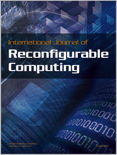
International Journal of Reconfigurable Computing
Connecting Researchers to the Heart of Reconfigurable ComputingWelcome to the International Journal of Reconfigurable Computing, a leading open-access platform dedicated to the exploration of innovative methodologies and applications in the field of reconfigurable computing. Published by HINDAWI LTD, this journal has been fostering scholarly communication since its inception in 2008. With an ISSN of 1687-7195 and an E-ISSN of 1687-7209, it offers researchers valuable access to the latest advancements and trending research in hardware and architecture, evidenced by its quarterly ranking in the Q4 category for 2023. Researchers, professionals, and students alike will find this journal an invaluable resource for staying updated in a rapidly evolving domain, notwithstanding its current Scopus ranking of 154 out of 177 within its category, reflecting a burgeoning opportunity for growth and engagement in this niche. Submitting their research to the International Journal of Reconfigurable Computing not only connects authors with a global audience but also contributes to the collective advancement of knowledge in this critical area. Explore the vast potential of reconfigurable systems and become part of a community dedicated to pushing the boundaries of computing technology.
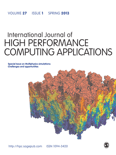
INTERNATIONAL JOURNAL OF HIGH PERFORMANCE COMPUTING APPLICATIONS
Bridging Theory and Practice in High-Performance ComputingThe INTERNATIONAL JOURNAL OF HIGH PERFORMANCE COMPUTING APPLICATIONS, published by SAGE PUBLICATIONS LTD, is a leading academic journal dedicated to the advancement of high-performance computing in various domains, including hardware, software, and theoretical frameworks. With a strong commitment to disseminating innovative research since its inception in 1987, the journal plays a pivotal role in bridging the gap between theoretical advancements and practical applications in computing. Featuring an impressive impact across its categories—ranked Q2 in Hardware and Architecture, Software, and Theoretical Computer Science—this journal appeals to a diverse audience of researchers and professionals seeking to explore the latest developments and applications in high-performance computing. The journal is accessible via various open access options, ensuring that cutting-edge research is available to a wide readership, fostering collaboration and knowledge-sharing within the global computing community. Scholars interested in pushing the boundaries of technology and its applications will find this journal an invaluable resource as it continues to evolve towards its projected convergence years, extending its influence through 2024 and beyond.

INTERNATIONAL JOURNAL OF PARALLEL PROGRAMMING
Transforming Ideas into Parallel Programming SolutionsInternational Journal of Parallel Programming, published by Springer/Plenum Publishers, is a prestigious peer-reviewed journal that has been at the forefront of research in parallel programming since its inception. With a commitment to advancing methodologies and applications in parallel processing, this journal serves a diverse audience of researchers, professionals, and students in the fields of Information Systems, Software, and Theoretical Computer Science. The journal's impact is evident in its respectable 2023 Scopus rankings, where it holds a position in the 68th percentile for Theoretical Computer Science and a solid standing in related categories. Its publication years span crucial developments in computing, making it an essential resource for anyone interested in parallel programming advancements. Although currently not offering open access, the journal ensures high-quality dissemination of knowledge and innovative research findings through its rigorous editorial standards. International Journal of Parallel Programming continues to be integral for those wishing to explore critical research and developments that influence the dynamic landscape of parallel computing.
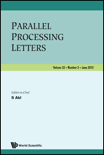
Parallel Processing Letters
Shaping the Future of Computational Architectures.Parallel Processing Letters is a notable academic journal published by World Scientific Publishing Co Pte Ltd, focusing on the dynamic fields of Computer Science, particularly in Hardware and Architecture, Software, and Theoretical Computer Science. Established in 1994, this journal provides a platform for the dissemination of cutting-edge research and developments in parallel processing and computational technologies. Despite its current Q4 ranking in multiple categories, Parallel Processing Letters plays an important role in fostering scholarly discussion and innovation within the computing community. With the ISSN 0129-6264 and E-ISSN 1793-642X, the journal is dedicated to maintaining rigorous academic standards while encouraging collaborative research conducive to the advancement of parallel processing systems. It serves as a valuable resource for researchers, professionals, and students seeking to deepen their understanding and gain insights into this rapidly evolving domain.
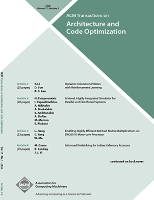
ACM Transactions on Architecture and Code Optimization
Shaping the Evolution of Architecture and CodeACM Transactions on Architecture and Code Optimization, published by the Association for Computing Machinery (ACM), serves as a premier journal in the fields of architecture, hardware, and software optimization. With an ISSN of 1544-3566 and E-ISSN of 1544-3973, this journal provides a platform for innovative research and discussion from 2004 to 2024, reflecting its commitment to the evolving landscape of computer science. Holding a Q2 ranking in key categories such as Hardware and Architecture, Information Systems, and Software, it stands out in its field, catering to a broad audience of researchers, professionals, and students alike. While the journal does not currently offer open access, subscribers can benefit from an array of valuable insights into cutting-edge techniques for optimizing code and architectural designs. Its rigorous peer-review process ensures that only high-quality, impactful research is published, making it an essential resource for those seeking to advance their knowledge and practice in these vital areas of computing.
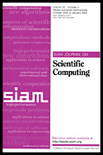
SIAM JOURNAL ON SCIENTIFIC COMPUTING
Advancing the Frontiers of Computational ScienceSIAM Journal on Scientific Computing is a premier journal published by SIAM Publications, focusing on the interdisciplinary domain of scientific computing. With a significant standing in the academic community, this journal boasts a 2023 Q1 ranking in both Applied Mathematics and Computational Mathematics, positioning it among the top-tier publications in these fields. The journal aims to disseminate high-quality research that applies computational methods to solve scientific and engineering problems, fostering advancements in numerical analysis, algorithms, and software development. Researchers and professionals can greatly benefit from the journal's rigorous peer-review process and its reputation for publishing cutting-edge studies. Though it is not an open-access journal, subscribing institutions and individual subscribers gain access to a wealth of knowledge tailored for those seeking to enhance their expertise in scientific computation. With its established history since 1996 and continuing to publish until 2024, the SIAM Journal on Scientific Computing remains an essential resource for students, researchers, and professionals dedicated to pushing the boundaries of this dynamic field.

DISTRIBUTED AND PARALLEL DATABASES
Connecting Scholars in the Realm of Database ExcellenceDistributed and Parallel Databases is a prestigious journal published by Springer, dedicated to advancing the field of database systems and distributed computing. With an ISSN of 0926-8782 and an E-ISSN of 1573-7578, this journal has been a prominent platform for disseminating significant research findings since its inception in 1993. The journal is recognized for its contributions across various dimensions of database technology, notably reflecting in its 2023 Quartile Rankings where it stands at Q3 in Hardware and Architecture and Software, while achieving a commendable Q2 in Information Systems and Management. With Scopus Ranking positioning it within the top half of key categories, the journal plays a crucial role in bridging theoretical and practical aspects of distributed database solutions. Although it does not currently offer open access options, it is widely accessible to institutions, making it an essential resource for researchers, professionals, and students keen on exploring the latest trends and innovations in the realm of distributed and parallel computing.